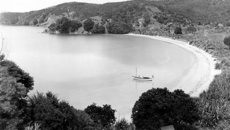
Are they going to stop?
This is the question being asked by the hundreds of thousands of New Zealanders whose votes drove Labour and the Greens from office. Stop what, you ask? That’s easy: stop the decolonisation and indigenisation of New Zealand.
Between 2017 and 2023, this frankly revolutionary project enjoyed the muted support of the incumbent government. Muted, because Labour politicians understood that if they were to give the D&I project their loud support, the public was bound to sit up and pay it the sort of attention that governments run a mile from.
Not that the political support needed to be anything other than muted, not when so much of the power structure was already convinced that a decolonised and indigenised “Aotearoa” was exactly where “New Zealand” should be heading – the sooner the better.
The ideological and intellectual grunt behind the D&I project comes primarily from universities. From the Vice-Chancellor’s office to the cramped cubicle of the lowliest research student, New Zealand’s universities, as conceived by the settler society that founded them, are being “reformed”. Condemned as transmission-belts for the white supremacist assumptions of Western science and scholarship, our institutions of higher learning have been actively pursuing the D&I project for the best part of 30 years. Indeed, it is their graduates who, like the early Christian missionaries, are carrying the sacred project into the depths of New Zealand’s state apparatus.
Doubters need only examine the New Zealand judiciary. For the past 20 years it has been the practice of successive governments to appoint to the Bench justices who more accurately reflect not only the ethnic composition of New Zealand society, but also the ideas of the generations who have grown up and received their legal training in a much more diverse and progressive culture than any New Zealand has hitherto known. Among this new generation of jurists, the idea that Te Tiriti O Waitangi could have been dismissed (by a Chief Justice no less) as “a simple nullity” was profoundly disturbing. For these budding judicial activists, the decolonisation and indigenisation of the New Zealand legal system cannot happen fast enough.
The D&I project has also sunk its roots deep into the New Zealand public service. Graduates from the humanities and the social sciences have been making their way up the bureaucratic ladder for decades, taking with them a deep suspicion of our institutional ideologies and the systemic “settler racism” encoded within them. For these progressives, the D&I project is regarded as profoundly emancipatory. Combined with the newly minted goal of “promoting equity”, the decolonisation and indigenisation of New Zealand society promises to be radically “transformational”.
It was these progressive bureaucrats who formulated the extraordinary undertakings that all media organisations wishing to access the $55 million Public Interest Journalism Fund were required to give in relation to Te Tiriti. To get their hands on the cash, publishers and broadcasters had to swallow whole the gospel according to the Waitangi Tribunal, New Zealand’s higher courts, and the growing army of Treaty-affirming academics. Not that the nation’s publishers and broadcasters – or their employees – were loath to comply with the Ministry of Heritage and Culture’s ideological diktat. Many of them had studied under the same professors.
Clearly, the D&I project has built up a head –of steam that makes stopping it in its tracks rather difficult to envisage. Where the incoming government is concerned, there can only be considerable doubt as to whether the largest party of the coalition, National, even wants it to stop. The National Party takes a particular pride in what it sees as its creative and forward-thinking approach to dealing with the issues arising out of New Zealand’s colonial past. It is also remarkably comfortable with the stark security questions that inevitably arise whenever it is suggested that the processes initiated by Jim Bolger and Doug Graham in the 1990s be brought to an end. The Treaty Settlement Process, which National set in motion, has kept the peace between Māori and Pakeha for more than 30 years. For many of National’s senior politicians, the idea of striking another deal, this time with the Iwi Leaders’ Group, has much to commend it.
For the idealists in Act, and the pragmatists in NZ First, however, the problems with the D&I project are not quantitative but qualitative. David Seymour and Winston Peters can see what Christopher Luxon either cannot, or will not, comprehend – that matters have moved beyond saying “sorry” for past breaches of the Treaty, and dumping a truckload of money into an iwi’s bank account. The challenges associated with the D&I project aren’t financial, they’re constitutional. The struggle is no longer about money, it has become a struggle for power.
For Act and NZ First, the notion that fundamental constitutional changes (of the sort suggested in the heavily “muted” He Puapua Report) might be implemented without first securing the consent, and then the endorsement, of a majority of New Zealanders is unacceptable. For Seymour and Peters, setting New Zealand/Aotearoa’s future constitutional direction cannot be a task for hand-picked “experts” formulating recommendations behind closed doors. The debate must be accessible to all citizens; it has to take place in public; and it must not be allowed to be shut down by judicial fiat, or threats of ethnic insurrection.
And while that debate is being set up, it is only right and proper that the D&I project be stopped in its tracks. In the clearest possible terms, it should be communicated to academia, the judiciary, the public service, and the publicly funded news media, that the relentless prosecution of “Aotearoa’s” case – at the expense of New Zealand’s – must cease.
That will be a bitter pill for the promoters of the D&I project to swallow. In their eyes, the demand will be seen as racist and reactionary – and, therefore, completely unacceptable. The enraged response of the 300 (out of 1800) Ministry of Foreign Affairs and Trade staff who protested publicly at the voluntary de-Māorification of MFAT communications is but a taste of things to come. The true believers in D&I will not accept that the election result changes anything. As far as they’re concerned, what they are doing is “right”, and what is right cannot be decided by counting heads.
On the other hand, there will be many, especially in the public service, who cannot wait for the ministries and departments to, like MFAT, begin “moving in the direction of the Fuhrer”. (As the ambitious civil servants in post-1933 Germany put it.) One Wellington bureaucrat, commenting (anonymously!) on social media, warned the rest of the country: “Don’t be alarmed if, after the election result is known, you feel the earth shudder under your feet. It will just be the effect of a thousand pounamu pendants hitting the floor simultaneously!”
Stop or go, the next three years will not be easy.
Take your Radio, Podcasts and Music with you









